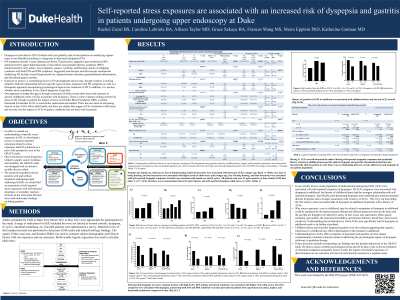Monday Poster Session
Category: Stomach
P2711 - Self-Reported Stress Exposures Are Associated with Increased Risk of Dyspepsia and Gastritis in Patients Undergoing Upper Endoscopy
Monday, October 23, 2023
10:30 AM - 4:15 PM PT
Location: Exhibit Hall

Has Audio

Rachel Zuzul, BS
Duke University
Durham, NC
Presenting Author(s)
Rachel Zuzul, BS, Caroline Labriola, BA, Allison Taylor, MD, Frances Wang, MS, Grace Sekaya, BA, Meira Epplein, PhD, Katherine Garman, MD
Duke University, Durham, NC
Introduction: It is widely acknowledged that stress is relevant in the pathophysiology of gastrointestinal disorders such as functional dyspepsia; however, the association is not fully understood. Adverse Childhood Events (ACEs) represent early-life stress exposures and are associated with irritable bowel syndrome, but the impact of ACEs in gastric conditions has not been well- examined. In this analysis we assessed the association of both ACEs and current adult stress with self-reported symptoms of dyspepsia, and secondarily clinically diagnosed gastritis, in a racially diverse, prospective cohort of individuals undergoing upper endoscopy (EGD).
Methods: Adult patients scheduled for an EGD at Duke from March 2021 to May 2023 were approached for participation in the Gastric Immune Response and Cancer Interception (GRACE) study. Enrolled participants were administered a survey at the time of EGD to assess self-reported stress, upper abdominal symptoms of dyspepsia, and demographic and lifestyle factors. Detailed review of medical records was performed to determine EGD results and related histology findings. Multivariable logistic regression was used to calculate odds ratios.
Results: Among the 200 participants who completed the survey, greater exposure to ACEs was associated with increased likelihood of dyspepsia (p=0.0053). Specifically, being exposed to 2 or more vs. 0 ACEs increased the odds of dyspepsia in adulthood (OR=2.94, 95% CI: 1.50-5.76). The relationship between ACEs and dyspepsia were consistent regardless of race. Significant associations with dyspepsia were found for all ACE categories (abuse, neglect, and household dysfunction) (p< 0001, p=0.0232, p=0.0230 respectively). For the outcome of gastritis in adulthood as determined from EGD procedure report or histology, ACEs in the abuse category was significant (p=0.0392).
Discussion: There is limited evidence linking stress exposures to dyspepsia and gastritis in the US. In our racially diverse study population of patients undergoing EGD, self-reported stress exposures were associated with both dyspeptic symptoms and clinically diagnosed gastritis, suggesting that stress exposures, particularly those in childhood, may be related to inflammation in the stomach in adulthood. A deeper understanding of the role of stress exposures in dyspepsia and gastritis could help identify new therapeutic strategies, as well as further determine the effect of exposure to stress and other risk factors, such as H. pylori, on the progression to gastric cancer.
Disclosures:
Rachel Zuzul, BS, Caroline Labriola, BA, Allison Taylor, MD, Frances Wang, MS, Grace Sekaya, BA, Meira Epplein, PhD, Katherine Garman, MD. P2711 - Self-Reported Stress Exposures Are Associated with Increased Risk of Dyspepsia and Gastritis in Patients Undergoing Upper Endoscopy, ACG 2023 Annual Scientific Meeting Abstracts. Vancouver, BC, Canada: American College of Gastroenterology.
Duke University, Durham, NC
Introduction: It is widely acknowledged that stress is relevant in the pathophysiology of gastrointestinal disorders such as functional dyspepsia; however, the association is not fully understood. Adverse Childhood Events (ACEs) represent early-life stress exposures and are associated with irritable bowel syndrome, but the impact of ACEs in gastric conditions has not been well- examined. In this analysis we assessed the association of both ACEs and current adult stress with self-reported symptoms of dyspepsia, and secondarily clinically diagnosed gastritis, in a racially diverse, prospective cohort of individuals undergoing upper endoscopy (EGD).
Methods: Adult patients scheduled for an EGD at Duke from March 2021 to May 2023 were approached for participation in the Gastric Immune Response and Cancer Interception (GRACE) study. Enrolled participants were administered a survey at the time of EGD to assess self-reported stress, upper abdominal symptoms of dyspepsia, and demographic and lifestyle factors. Detailed review of medical records was performed to determine EGD results and related histology findings. Multivariable logistic regression was used to calculate odds ratios.
Results: Among the 200 participants who completed the survey, greater exposure to ACEs was associated with increased likelihood of dyspepsia (p=0.0053). Specifically, being exposed to 2 or more vs. 0 ACEs increased the odds of dyspepsia in adulthood (OR=2.94, 95% CI: 1.50-5.76). The relationship between ACEs and dyspepsia were consistent regardless of race. Significant associations with dyspepsia were found for all ACE categories (abuse, neglect, and household dysfunction) (p< 0001, p=0.0232, p=0.0230 respectively). For the outcome of gastritis in adulthood as determined from EGD procedure report or histology, ACEs in the abuse category was significant (p=0.0392).
Discussion: There is limited evidence linking stress exposures to dyspepsia and gastritis in the US. In our racially diverse study population of patients undergoing EGD, self-reported stress exposures were associated with both dyspeptic symptoms and clinically diagnosed gastritis, suggesting that stress exposures, particularly those in childhood, may be related to inflammation in the stomach in adulthood. A deeper understanding of the role of stress exposures in dyspepsia and gastritis could help identify new therapeutic strategies, as well as further determine the effect of exposure to stress and other risk factors, such as H. pylori, on the progression to gastric cancer.
Disclosures:
Rachel Zuzul indicated no relevant financial relationships.
Caroline Labriola indicated no relevant financial relationships.
Allison Taylor indicated no relevant financial relationships.
Frances Wang indicated no relevant financial relationships.
Grace Sekaya indicated no relevant financial relationships.
Meira Epplein indicated no relevant financial relationships.
Katherine Garman indicated no relevant financial relationships.
Rachel Zuzul, BS, Caroline Labriola, BA, Allison Taylor, MD, Frances Wang, MS, Grace Sekaya, BA, Meira Epplein, PhD, Katherine Garman, MD. P2711 - Self-Reported Stress Exposures Are Associated with Increased Risk of Dyspepsia and Gastritis in Patients Undergoing Upper Endoscopy, ACG 2023 Annual Scientific Meeting Abstracts. Vancouver, BC, Canada: American College of Gastroenterology.
